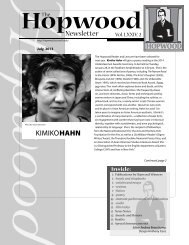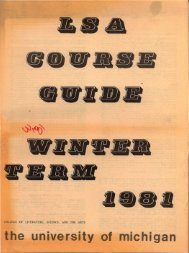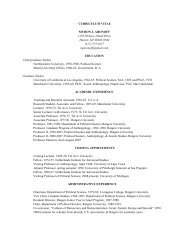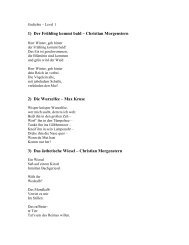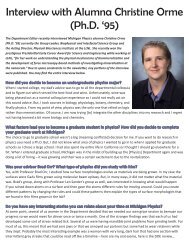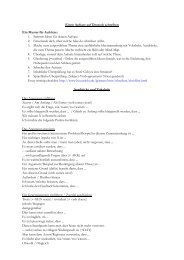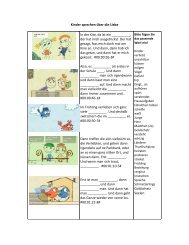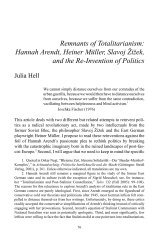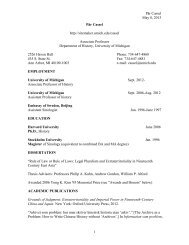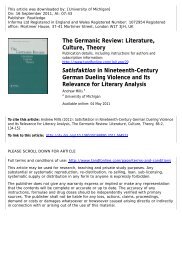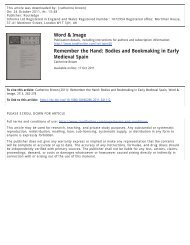Making History Personal: Constantine Cavafy and the Rise of Rome
Making History Personal: Constantine Cavafy and the Rise of Rome
Making History Personal: Constantine Cavafy and the Rise of Rome
Create successful ePaper yourself
Turn your PDF publications into a flip-book with our unique Google optimized e-Paper software.
Frier, “<strong>Making</strong> <strong>History</strong> <strong>Personal</strong>,” page 23<br />
show similarly sly good humor in “The Year 31 B.C. in Alex<strong>and</strong>ria” (1917/1924). An incense<br />
peddler, come from <strong>the</strong> countryside to hawk his wares in Alex<strong>and</strong>ria, is overtaken by celebra-<br />
tions, “<strong>the</strong> tremendous stir, / <strong>and</strong> <strong>the</strong> music, <strong>and</strong> parades.” When he inquires, “someone tosses<br />
him <strong>the</strong> palace’s gargantuan lie: / that victory in Greece belongs to Antony.” This poem is based<br />
upon a report in Dio (51.5.4-5) that Cleopatra, fearing that after her crushing defeat at Actium<br />
her return to Alex<strong>and</strong>ria would be obstructed by her enemies, “crowned her prows with garl<strong>and</strong>s<br />
as if she had actually won a victory, <strong>and</strong> had songs <strong>of</strong> triumph chanted to <strong>the</strong> accompaniment <strong>of</strong><br />
flute-players,” all to buy herself time in which to dispatch <strong>the</strong> opposition. But again in this poem<br />
<strong>Cavafy</strong> fails to mention Cleopatra, lest her glamorous name, riveting audiences through <strong>the</strong> ages,<br />
overwhelm his primary subject, <strong>the</strong> mischievous frivolity <strong>of</strong> <strong>the</strong> Alex<strong>and</strong>rian common people.<br />
Bust <strong>of</strong> Mark Antony, from <strong>the</strong> Vatican Museums<br />
(http://schools-wikipedia.org/wp/m/Mark_Antony.htm)<br />
In two poems, “The End <strong>of</strong> Antony” (1907) <strong>and</strong> “The<br />
God Ab<strong>and</strong>ons Antony (1910), <strong>Cavafy</strong> deals with <strong>the</strong> last two<br />
days <strong>of</strong> Antony’s life in 30 BCE, as Octavian’s forces closed in<br />
on Alex<strong>and</strong>ria <strong>and</strong> he was forced toward suicide. The poems<br />
make an arresting contrast. “The End <strong>of</strong> Antony,” an unpub-<br />
lished poem, is based on a passage <strong>of</strong> Plutarch (Antony 77.3-4). In Plutarch’s account, Antony,<br />
moribund as a result <strong>of</strong> a botched suicide attempt, had been drawn up on a litter into Cleopatra’s<br />
mausoleum in Alex<strong>and</strong>ria. The Queen began to wail uncontrollably, but he “stopped her lamen-<br />
tations” <strong>and</strong> calmly “advised her to consult her own safety … not to lament him for his last re-<br />
verses, but to count him happy for <strong>the</strong> good things that had been his, since he had become most<br />
illustrious <strong>of</strong> men, had won greatest power, <strong>and</strong> now had been not ignobly conquered, a Roman<br />
by a Roman.” 75<br />
<strong>Cavafy</strong> follows much <strong>of</strong> this account closely, but, once again, he sidelines Cleopatra,<br />
described only tangentially as “madame with her Oriental flailings”; it is mainly <strong>the</strong> sob-<br />
bing <strong>of</strong> “<strong>the</strong> slave-girls with <strong>the</strong>ir barbarous Greek” that awakened “<strong>the</strong> l<strong>of</strong>ty pride within his<br />
75 As Pelling, Antony (1988) 305-306, observes, this speech, which is “doubtless imaginary,” is modeled on<br />
o<strong>the</strong>r much admired last words in which heroic figures “remember[ ] <strong>the</strong>ir good fortune as <strong>the</strong>y die.” Dio 51.10.9<br />
does not record a final speech by Antony.



